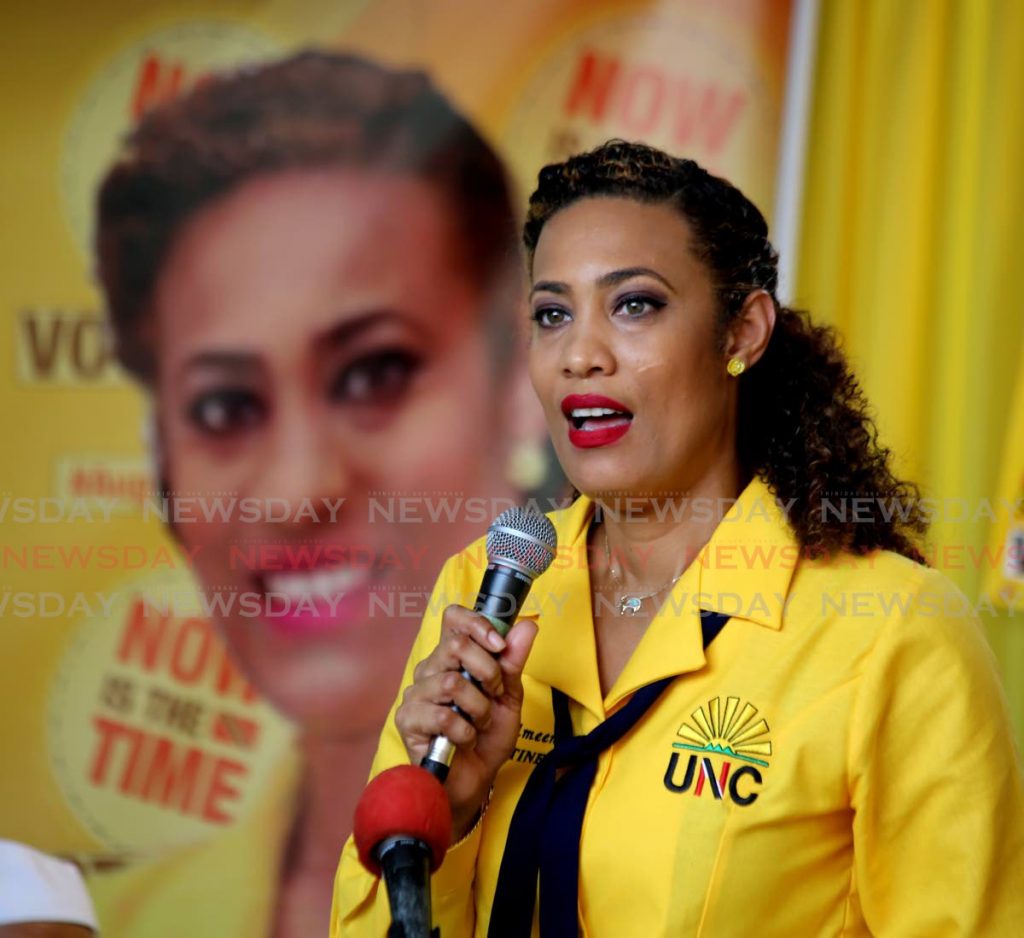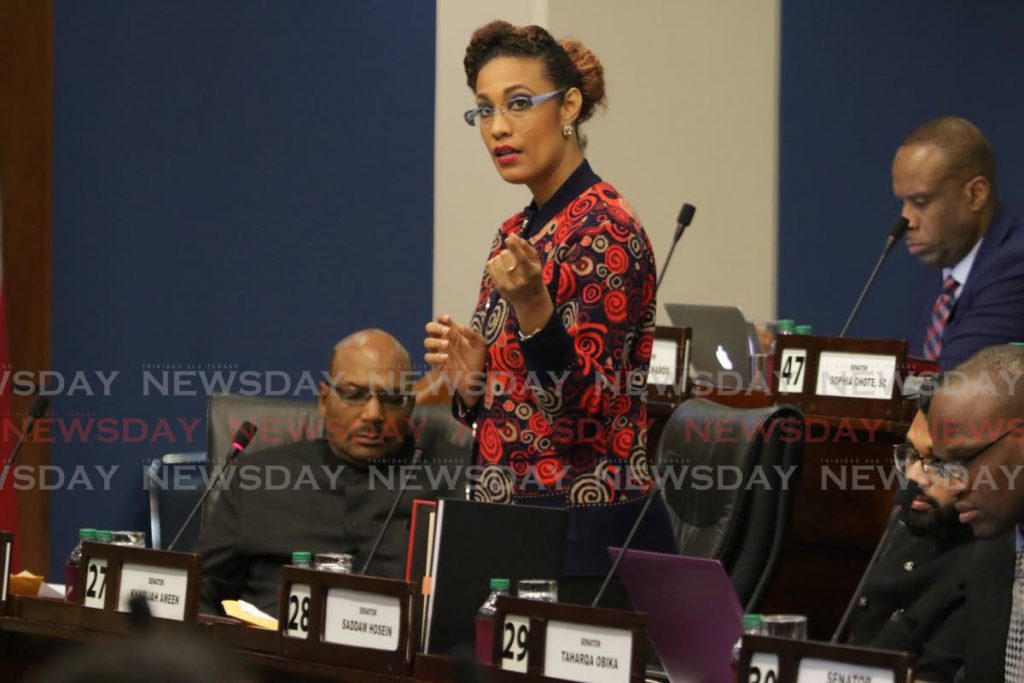Janelle De Souza
2 Hrs Ago

While Khadijah Ameen is elated that she won the St Augustine seat for the United National Congress (UNC) in the general election last Monday, the feeling was bittersweet because her party did not win the government.
The 39-year-old said, “There are thousands of UNC financial members in the constituency so I’m happy to be their voice and to be their representative. But as an MP my commitment is to represent all, regardless of who they supported in the election and who they voted for.” She noted that five people contested the seat.
Ameen was happy with her team for fighting a clean campaign, which she said early on would not be about personal attacks but her plans for St Augustine and for TT.
She did not hold any meetings but went house to house, hearing people’s concerns and sharing her phone and e-mail address to keep communication open between her and the constituents. Because of that she felt confident she would win, which she did with 11,943 votes to the People’s National Movement’s 5,264.
She said she had a number of plans for the constituency that were based on the UNC’s plans if they won the election. They included creating 50,000 jobs by establishing an aircraft maintenance and repair hub at Piarco, and a bio-technology manufacturing corridor.

Still, she said, she hoped to resolve other issues such as bad drainage and the alleviation of flooding in Bamboo, St Augustine South, and Oropune which she said was a result of neglect and not maintaining the watercourses.
She also intended to address land regularisation, the completion and opening of the Curepe Presbyterian Primary School, and the empowerment of youth groups, sporting organisations, and NGOs that bring the community together.
“During my campaign I asked people to not just vote and go away to come back five years later to vote, but to stand with me as an MP given the PNM’s neglect of constituencies led by UNC MPs. I asked them to participate in town meetings, medical clinics, sports days, youth initiatives and any constituency activities. Democracy is not just about voting, it’s about participation.”
She added that during her campaign she saw some people who stood with her when she contested as a first-time councillor in 2003, people she considered her extended family. It brought back memories of their kindness and reminded her there were genuine, kind and good people who worked together for the interest of the community.
“They don’t do it for themselves, they do it for others. That remarkable human touch is what inspires me to continue my work, in spite of the nastiness and attacks that may come from the other side, or from people who don’t know you, or from people who try to get you to compromise to do them personal favours.”

Regardless of who was in government, she said she intended to be a strong advocate for the people of St Augustine and to work with them to get issues resolved.
I’m prepared
Ameen told WMN her experience as a councillor (2003-2013) and as a senator (2015-2020) would be an asset as an MP. She was also adviser to the local government minister from 2013-2015.
For seven of her ten years as a councillor the UNC was the Opposition. In those years, she said she had very little resources, but her presence in the community was consistent. Then, for three years during the People’s Partnership government, she was chairman of the Tunapuna/Piarco Regional Corporation, which covered nine constituencies.
She said because of efficient leadership and management, and by partnering with central government, she was able to deliver about four times the number of projects of other corporations, including constructing river banks and retention ponds, and installing pumps.
“My time in local government gives me the hands-on, on-the-ground experience. My experience for the five years in the Senate gave me an opportunity to participate in the Parliament in a way that I did not when I was a councillor. It is now pairing both as an MP, being required to be on the ground with the constituents as well as speaking in Parliament on legislative matters and national issues, and tying those with the constituency’s needs.”
Ameen was born in Curepe but spent her formative years in Carapo, where she was active in her community even before she could vote.

Around 16, while at St George’s College, she became the assistant secretary of the Evergreen Village Council, helped children with their homework after school, and was a founding member of the NGO Evergreen Youth and Sports Group. There, she said, she organised coaching clinics, got sponsors for sporting and community activities, and networked with NGOs outside the community.
At 19, while awaiting A-Level results from Arima Senior Comprehensive, she said she joined the UNC because of the neglect of the PNM. At the time Carapo had a PNM councillor and MP, both of whom the village council tried and failed to engage. So the council had to do everything for the community on its own.
“I recognised there was a need for the use of a political vehicle to do the things I was trying to do in my community.”
After her A-Levels, she got a job as a data entry clerk at the Unemployment Relief Programme, then in the data management department at NIB until her contract came to an end in 2003.
Around the same time, then UNC leader Basdeo Panday gave a speech about national unity and performance. Since she wanted to deliver for her community, she filed to become a councillor in what was then the new district of Valsayn/South Carapo, which was south of the Churchill Roosevelt highway from Carapo to Grand Bazaar.
She was surprised when she was selected at 21, as there were older, more experienced candidates, but she was determined to do her best. However, she said she was in a PNM corporation so very few projects got approved. Instead she relied on her NGO and business contacts to get things done when there were emergencies such as flooding in the area.
At 24 she became a mother, had a job in a government office, was still a councillor, and was studying for a certificate in public administration at UWI.
She was 28 when she was selected as chairman of the Tunapuna/Piarco Regional Corporation, the youngest person to hold the post, even when the corporation was the St George East County Council.
In 2010, as part of the People’s Partnership, she campaigned with the Congress of the People’s Prakash Ramadhar for St Augustine. She was writing her finals at UWI but contested and won the St Augustine South /Piarco/St Helena local government seat.
In 2015, she finished her masters in business administration.
“The experience of balancing being a mother, having a regular job, being a councillor while studying at UWI gave me the experience of balancing home, work and personal development. And I think education and personal development is important when you are a representative so you can better equip yourself to represent people.”
TT has to evolve
Ameen said the only personal issue she had was when she was a councillor and then chairman of the regional corporation was that people did not take her seriously because of her age. Many of the staff were older than she and questioned the decisions of “this little girl,” but they soon learned to trust her judgement.
“I think, as young people and as women, at some point we all have to prove ourselves, but that is not only with politics. All of us should have to prove ourselves, regardless of our gender, our age or our ethnicity, based on our ability to deliver, our personal integrity, our willingness to stand up for what is right. To me that is what we should be judged on. And the public should demand and highlight that instead of personal issues and attacks.”
She said she initially learned to focus on performance rather than things like gender, race, and religion from her father, who raised her to be a person first.
“That is how I judge and interact with other people, based on their characteristics, their integrity, their philosophy, what they stand for first, before gender and so on.”
She said she recognised that society’s expectations of women were different from their expectations of men. However she believed TT’s moves to encourage girls to be educated and have careers meant those expectations were no longer as stringent.
“Women have been effective in terms of how governance and how leadership is accepted in this country. When a male political leader makes a statement comparing women to golf courses, women are comfortable coming out and strongly condemning that, and those are positive signs.”
She said women must continue to eliminate that kind of behaviour through positive female leadership, informing men, and education for both.
Yet she admitted expected gender norms was still an issue. She gave the example of TT’s first woman President, Paula-Mae Weekes. She said one of the first questions Weekes was asked was if she was married, even though the issue was irrelevant to her position.
“I still think that our population has space to grow in terms of judging our politicians based on competence and not other personal issues.”



Source link
